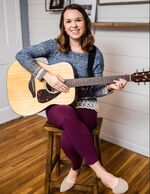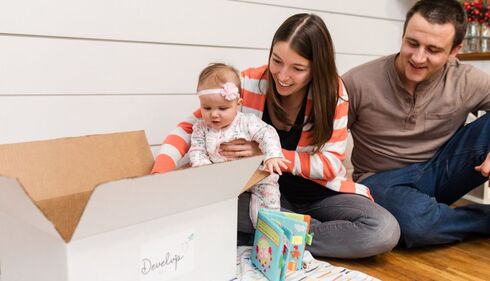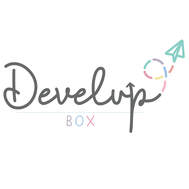About Develup Box
Develup Box, LLC was established in 2020 when Adam and Lindsay were inspired to combine their passion and professions into a business that helps caregivers better understand their child's developmental journey. Adam is a licensed pediatric occupational therapist, and Lindsay is a board-certified music therapist. Together, they used their expertise to create a quarterly subscription box to support the developmental needs of your child's first 2 years of life. To accurately address every milestone, we have created 8 different boxes, which focuses on 3 months at a time. Each box contains different materials, such as toys, bottles, utensils, bowls for feeding, instruments, and books. Additionally, each box contains the most up-to-date information about your child's development and meaningful activities to engage in with your child using the items in the boxes. Below you will find a general description of each box:
0-3 months: The milestones and skills focused on in this box include visual development, introduction to the body's sensory systems, sound localization, tummy time, and early feeding for your infant.
4-6 months: The milestones and skills focused on in this box include palmar grasp development, feeding, rolling, sensory exploration, and introduction to baby sign language.
7-9 months: The milestones and skills focused on in this box include radial-palmar grasp development, independent sitting, standing with assistance, bilateral hand coordination, and self-feeding exploration through sensory play.
10-12 months: The milestones and skills focused on in this box include imitating sounds, oral motor skills, finger isolation, pincer grasp, baby sign language, and exploring the concept of "trial and error" through play.
13-15 months: The milestones and skills focused on in this box include walking, self-feeding, continued sensory development, early language skills, and exploring the concept of "cause and effect" through play.
16-18 months: The milestones and skills focused on in this box include sensory development and play, walking, balance, and imitation skills.
19-21 months: The milestones and skills focused on in this box include visual-spatial development, advanced grasp patterns, cause and effect, fine motor skills, and sensory play.
22-24 months: The milestones and skills focused on in this box include speech and language development, fine motor skills, completion of basic functional tasks to increase independence, and balance and coordination.
Develup Box, LLC was established in 2020 when Adam and Lindsay were inspired to combine their passion and professions into a business that helps caregivers better understand their child's developmental journey. Adam is a licensed pediatric occupational therapist, and Lindsay is a board-certified music therapist. Together, they used their expertise to create a quarterly subscription box to support the developmental needs of your child's first 2 years of life. To accurately address every milestone, we have created 8 different boxes, which focuses on 3 months at a time. Each box contains different materials, such as toys, bottles, utensils, bowls for feeding, instruments, and books. Additionally, each box contains the most up-to-date information about your child's development and meaningful activities to engage in with your child using the items in the boxes. Below you will find a general description of each box:
0-3 months: The milestones and skills focused on in this box include visual development, introduction to the body's sensory systems, sound localization, tummy time, and early feeding for your infant.
4-6 months: The milestones and skills focused on in this box include palmar grasp development, feeding, rolling, sensory exploration, and introduction to baby sign language.
7-9 months: The milestones and skills focused on in this box include radial-palmar grasp development, independent sitting, standing with assistance, bilateral hand coordination, and self-feeding exploration through sensory play.
10-12 months: The milestones and skills focused on in this box include imitating sounds, oral motor skills, finger isolation, pincer grasp, baby sign language, and exploring the concept of "trial and error" through play.
13-15 months: The milestones and skills focused on in this box include walking, self-feeding, continued sensory development, early language skills, and exploring the concept of "cause and effect" through play.
16-18 months: The milestones and skills focused on in this box include sensory development and play, walking, balance, and imitation skills.
19-21 months: The milestones and skills focused on in this box include visual-spatial development, advanced grasp patterns, cause and effect, fine motor skills, and sensory play.
22-24 months: The milestones and skills focused on in this box include speech and language development, fine motor skills, completion of basic functional tasks to increase independence, and balance and coordination.
About the Therapists

Adam Amspacher, M.S., OTR/L
Adam is a registered and licensed pediatric occupational
therapist residing in south-central Pennsylvania. Adam attended
Elizabethtown College and has a Master of Science in Occupational
Therapy degree. He has worked in school-based occupational
therapy and currently works with pediatrics at an
outpatient clinic in York, PA. He sees babies, toddlers, and older children
with and without developmental delay diagnoses. In addition,
he specializes in feeding therapy for kiddos. In his free time, Adam
enjoys camping, being outdoors, and working on various home and
woodworking projects.
Adam is a registered and licensed pediatric occupational
therapist residing in south-central Pennsylvania. Adam attended
Elizabethtown College and has a Master of Science in Occupational
Therapy degree. He has worked in school-based occupational
therapy and currently works with pediatrics at an
outpatient clinic in York, PA. He sees babies, toddlers, and older children
with and without developmental delay diagnoses. In addition,
he specializes in feeding therapy for kiddos. In his free time, Adam
enjoys camping, being outdoors, and working on various home and
woodworking projects.

Lindsay Amspacher, MT-BC
Lindsay is a board-certified music therapist residing in
south-central Pennsylvania. Lindsay attended Elizabethtown
College and has a Bachelor of Music in Music Therapy degree
with a minor in psychology. She currently works as an independent
contractor for two different companies. Lindsay works with a variety
of ages and diagnoses, but she has a special interest in the pediatric population.
She teaches early enrichment preschool music classes and works with
many kiddos with developmental delays. In her free time, Lindsay enjoys
being outdoors, spending time with family and friends, and playing with
her puppy, Noodle!
Lindsay is a board-certified music therapist residing in
south-central Pennsylvania. Lindsay attended Elizabethtown
College and has a Bachelor of Music in Music Therapy degree
with a minor in psychology. She currently works as an independent
contractor for two different companies. Lindsay works with a variety
of ages and diagnoses, but she has a special interest in the pediatric population.
She teaches early enrichment preschool music classes and works with
many kiddos with developmental delays. In her free time, Lindsay enjoys
being outdoors, spending time with family and friends, and playing with
her puppy, Noodle!
What is occupational therapy?
Occupational therapy is the use of individualized assessments and interventions to develop, rehabilitate, or maintain full engagement and participation in daily routines and activities within one's life. Specifically, pediatric occupational therapy focuses on promoting the development of children through engagement in meaningful activities to address play, sensory processing, self feeding, self-care tasks, functional mobility, and cognition. Pediatric occupational therapists assist individuals 0-21 years old meet their greatest potential through activities and interventions that are both evidenced-based and meaningful to those individuals. An occupational therapist must complete a Master's Degree from an accredited occupational therapy program, a 4-year Bachelors undergraduate degree, two clinical fieldwork rotations, and pass the NBCOT exam to become board-certified.
What is music therapy?
Music therapy is the individualized and evidence-based use of music interventions to address social, emotional, developmental, communication, and cognitive goals with a wide variety of ages and diagnoses. Music therapy utilizes the elements of music, such as rhythm, melody, and tempo to activate different areas of the brain involved in learning and speech. Music therapy focuses on the relationship between the client, therapist, and the music itself to address goals. A music therapist must complete a 4-year Bachelor's degree or equivalency program, an approved internship, and pass an exam to become board-certified.
Occupational therapy is the use of individualized assessments and interventions to develop, rehabilitate, or maintain full engagement and participation in daily routines and activities within one's life. Specifically, pediatric occupational therapy focuses on promoting the development of children through engagement in meaningful activities to address play, sensory processing, self feeding, self-care tasks, functional mobility, and cognition. Pediatric occupational therapists assist individuals 0-21 years old meet their greatest potential through activities and interventions that are both evidenced-based and meaningful to those individuals. An occupational therapist must complete a Master's Degree from an accredited occupational therapy program, a 4-year Bachelors undergraduate degree, two clinical fieldwork rotations, and pass the NBCOT exam to become board-certified.
What is music therapy?
Music therapy is the individualized and evidence-based use of music interventions to address social, emotional, developmental, communication, and cognitive goals with a wide variety of ages and diagnoses. Music therapy utilizes the elements of music, such as rhythm, melody, and tempo to activate different areas of the brain involved in learning and speech. Music therapy focuses on the relationship between the client, therapist, and the music itself to address goals. A music therapist must complete a 4-year Bachelor's degree or equivalency program, an approved internship, and pass an exam to become board-certified.


